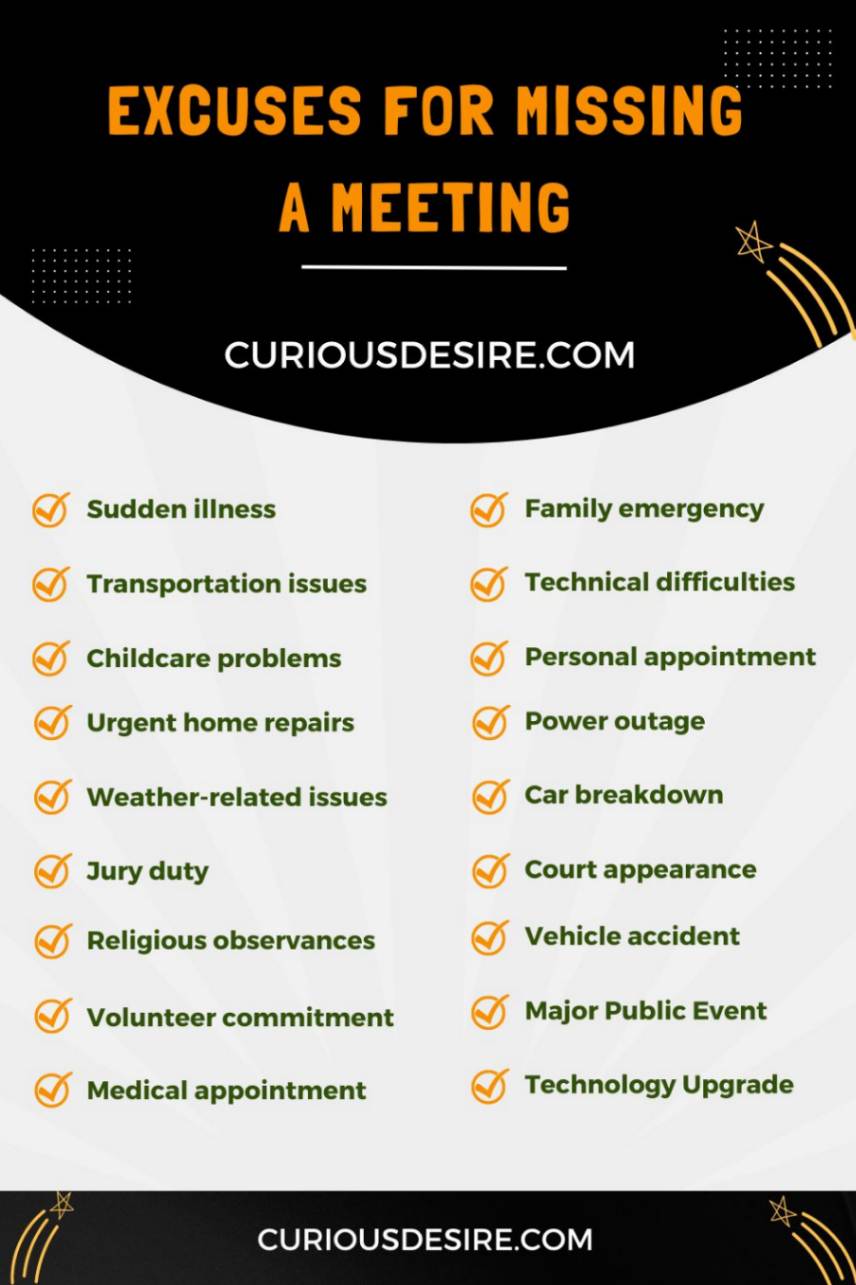Stepping on the rollercoaster ride of professional life, we often find ourselves going through unexpected twists and turns. This article is all about those common reasons, explained in simple terms, why someone might miss a meeting.
From health issues to family matters, technical glitches to personal responsibilities, we’re breaking down 30 genuine excuses in understandable language.
Understanding these reasons helps create a workplace that values flexibility and compassion, recognizing that life isn’t always predictable.
So, let’s explore these everyday situations that might lead someone to step back from a meeting, making work a bit more relatable and understanding.
Here are the 5 most common excuses for missing a meeting:
Health is our most valuable asset, and when sudden illnesses, like a debilitating migraine or a stomach bug, emerge, it becomes important to prioritize self-care.
In the interest of long-term productivity, taking the necessary time to recover ensures that one can return to work with full focus and energy.
Communicating the need for a temporary absence due to health concerns reflects responsibility and a commitment to maintaining overall well-being.
2. Family Emergency
Family emergencies are unexpected and can range from a loved one requiring urgent medical attention to sudden household crises. These situations demand immediate attention and emotional support.
Recognizing the importance of family and being present in critical times strengthens the values of empathy and work-life balance.
Sharing these personal challenges with colleagues demonstrates transparency and promotes a supportive work environment.
3. Transportation Issues
Even with careful planning, transportation setbacks such as a flat tire, unexpected public transport delays, or traffic delays can disrupt timely attendance at a meeting.
Addressing these issues and communicating potential delays show a proactive approach to problem-solving.
It highlights the commitment to professionalism and reliability, assuring colleagues that steps are being taken to overcome unforeseen obstacles.
4. Unforeseen Work Commitments
Work environments can be dynamic, and unforeseen work commitments like sudden urgent tasks or unexpected projects may demand immediate attention.
Demonstrating adaptability and a willingness to go above and beyond to fulfill work responsibilities highlights commitment and professionalism.
Clear communication about the nature of these unexpected commitments helps colleagues understand the urgency and necessity of rescheduling the meeting.
5. Internet or Technical Difficulties
In an era heavily reliant on technology, unexpected technical glitches such as an internet outage, computer malfunction, or software issue can disrupt virtual meeting plans.
Actively troubleshooting and resolving these technical challenges shows a commitment to overcoming obstacles.
It also emphasizes the need for contingency plans and technology support to ensure smooth and uninterrupted virtual communication.
6. Childcare Problems
Parents may face sudden childcare challenges, such as a babysitter canceling or a child falling unexpectedly ill.
Balancing work commitments with parental responsibilities is an ongoing challenge, and addressing these issues highlights the need for understanding and flexibility in the workplace.
Sharing these challenges promotes a culture of empathy and support among colleagues.
7. Personal Appointment
Scheduled personal appointments, whether for a routine medical check-up or dentist visit, are important for maintaining overall health.
When these appointments coincide with meeting times, it becomes necessary to prioritize personal well-being.
Transparently communicating the need for a brief absence for health-related reasons highlights the commitment to long-term well-being and sets a positive example for a healthy work-life balance.
8. Last-Minute Business Trip
The fast-paced nature of business sometimes demands immediate responses, leading to last-minute business trips.
These trips may be necessary for important negotiations or unforeseen opportunities that contribute to the broader professional goals of the organization.
Communicating the necessity of the trip and the potential impact on the meeting reflects a commitment to organizational success and adaptability in a dynamic business landscape.
9. Urgent Home Repairs
Home emergencies, such as a burst pipe or malfunctioning appliance, require immediate attention to prevent further damage.
Addressing urgent home repairs reflects a commitment to maintaining a safe and functional living environment.
It also highlights the need for understanding among colleagues, as unexpected home emergencies can impact work commitments unexpectedly.
10. Power Outage
Unforeseen power outages, whether due to severe weather or technical issues, can disrupt both virtual and in-person meeting participation.
During such events, communication channels may be compromised, making it challenging to maintain consistent connectivity.
Acknowledging the impact of a power outage on meeting participation highlights the need for flexibility in adapting to unexpected circumstances and highlights the importance of robust communication infrastructure.
11. Car Breakdown
Cars can be unpredictable, and sometimes they decide to break down unexpectedly. When your primary mode of transportation is out of commission, it becomes impossible to reach the meeting venue.
Addressing the car issue and seeking repairs show a commitment to overcoming unforeseen challenges and maintaining reliability.
12. Weather-Related Issues
Mother Nature can sometimes throw a curveball, whether it’s heavy rain, snow, or other extreme weather conditions. These situations can pose safety risks, making it difficult or unsafe to travel.
Communicating weather-related concerns highlights the importance of personal safety and responsibility.
13. Loss of Phone or Communication Device
In today’s connected world, our phones are important. If, for some reason, you lose your phone or face a communication device malfunction, it highlights your ability to participate in the meeting.
Quickly resolving or replacing the device shows a commitment to staying connected and fulfilling work responsibilities.
14. Unexpected Pet-Related Concerns
Pets are part of the family, and sometimes unexpected issues arise, such as a pet falling ill or needing urgent attention.
Balancing pet care with work commitments is important, and addressing these concerns highlights the need for understanding and flexibility in the workplace.
15. Jury Duty
Civic responsibilities, like serving on a jury, are mandatory. When called for jury duty, attendance is non-negotiable and can disrupt work plans.
Communicating the obligation for jury duty highlights the importance of fulfilling legal responsibilities and contributing to the justice system.
16. School-Related Obligations
For those with children, school-related obligations such as parent-teacher meetings or school events can coincide with work commitments.
Prioritizing involvement in a child’s education shows a commitment to family and the importance of being present for significant moments in a child’s life.
17. Visa or Immigration Complications
For individuals dealing with visa or immigration matters, unexpected complications can arise, requiring immediate attention.
Prioritizing these legal processes takes precedence and may impact scheduled meetings. Communicating the situation highlights the need for understanding and the importance of legal compliance.
18. Civic or Community Engagement
Being actively involved in civic or community activities is commendable. Whether it’s volunteering, participating in local events, or community service, these engagements can sometimes overlap with work commitments.
Communicating the dedication to community involvement promotes a positive image of social responsibility.
19. Religious Observances
Religious practices and observances are personal and significant. When religious obligations coincide with work commitments, it becomes important to prioritize these observances.
Communicating the need for a brief absence due to religious reasons highlights respect for diverse beliefs and practices.
20. Internet Service Provider Outage
Instead of our reliance on the internet, service outages can occur unexpectedly. When the internet service is down, it disrupts virtual communication and participation in meetings.
Quickly addressing the issue and seeking alternative solutions shows a commitment to overcoming technological challenges and maintaining reliable communication.
21. Court Appearance
Legal responsibilities, like a court appearance, are mandatory and can disrupt work plans. For instance, if you’ve been summoned for jury duty or as a witness, attending court becomes non-negotiable.
Communicating this obligation highlights the importance of fulfilling legal duties, and ensuring the justice system functions effectively.
22. Unexpected Visitor or Guest
Imagine a family member or friend unexpectedly drops by during your work hours. It becomes challenging to attend a meeting as you navigate unexpected personal commitments.
23. Family Celebration or Event
Picture a surprise family celebration or event cropping up. Balancing work commitments with personal celebrations is important, and expressing the need to be part of family moments shows a commitment to personal relationships and values.
24. Medical Appointment
Regular health check-ups contribute to overall well-being. If a medical appointment coincides with a meeting, it’s important to prioritize personal health.
Explaining the need for a brief absence due to health reasons sets a positive example for a healthy work-life balance.
25. Internet Security Concerns
Concerns about online security may arise, requiring time to address potential risks.
For instance, if there’s suspicion of an online security threat, taking the necessary measures to secure online information shows a commitment to maintaining a safe work environment.
26. Personal Development Seminar or Workshop
Enrolling in a personal development seminar is an opportunity for growth. If such a seminar overlaps with a meeting, communicating the commitment to self-improvement promotes a positive image of continuous learning and personal advancement.
27. Vehicle Accident
In the unfortunate event of a vehicle accident, attending a meeting becomes impossible. Quickly addressing the situation, seeking necessary assistance, and prioritizing safety show a commitment to responsibly handling unexpected challenges.
28. Volunteer Commitment
Imagine being involved in a community event or volunteer project that coincides with work hours. Communicating this commitment highlights a dedication to social responsibility and community engagement, showcasing a well-rounded approach to life.
29. Rescheduled Meeting Clash
Meetings can sometimes get rescheduled, causing clashes with prior commitments.
For example, if a rescheduled meeting coincides with a pre-planned family event, communicating the clash and working towards a solution highlights adaptability and effective communication skills.
30. Unexpected Financial Matters
Unexpected financial matters, such as dealing with a sudden expense, may require immediate attention. Explaining the situation highlights transparency and the need for understanding during challenging times.
It’s about being responsible with personal matters and seeking support when needed.
31. Lost Important Documents
Misplacing important work documents last minute is a common challenge. Imagine needing a vital report for the meeting, only to find it mysteriously gone.
Quickly searching for it and explaining the situation showcases responsibility and urgency to resolve the issue, ensuring the meeting’s productivity.
32. Major Public Event
Finding yourself during a significant public event during work hours is unexpected. Picture being stuck in a crowded area, making it impossible to attend the meeting on time.
Communicating this unique situation highlights the unexpected challenges life can throw our way and the need for flexibility in the workplace.
33. Unexpected Personal Milestones
Celebrating a personal achievement, like a work anniversary or personal goal, can sometimes coincide with a meeting. Imagine reaching a professional milestone, deserving a moment of acknowledgment.
Communicating the need to step back briefly for personal celebration reflects a balanced approach to work and life, promoting a positive workplace culture.
24. Technology Upgrade
During a critical technology upgrade, unexpected issues may arise, demanding immediate attention. Imagine a system glitch affecting your ability to participate in the meeting.
Actively working to resolve the technical challenges shows dedication to maintaining a smooth workflow and ensures efficient collaboration.
25. Neighborly Emergency
A sudden emergency involving a neighbor requires immediate attention and support. Picture rushing to assist a neighbor dealing with a crisis, making it impossible to attend the meeting.
Transparently communicating the need to assist a neighbor showcases empathy and community responsibility, fostering a supportive workplace environment.
26. Community Crisis Response
Volunteering for a community crisis response is an admirable but unexpected commitment. Imagine being called to help during a local crisis, affecting your availability for the meeting.
Communicating this civic duty highlights a commitment to community well-being, emphasizing the broader role individuals play beyond their professional responsibilities.
27. Injury or Physical Discomfort
Suffering an unexpected injury or physical discomfort can disrupt your ability to attend a meeting. Imagine dealing with sudden back pain or a sprained ankle.
Communicating the need for rest and recovery highlights the importance of health in maintaining work commitments and promotes a culture of well-being.
28. Tax or Financial Audit
Dealing with an unexpected tax or financial audit demands immediate attention. Imagine receiving an unexpected audit notice, requiring thorough documentation and time.
Transparently communicating this financial obligation highlights responsibility and the need for focused attention, to ensuring legal compliance.
29. Personal Security Concerns
Addressing sudden personal security concerns is a top priority. Whether it’s a security breach or personal safety concerns, ensuring one’s well-being takes precedence.
Communicating the need to address security matters reflects a commitment to personal safety and promotes a secure and supportive work environment.
40. Unexpected Workplace Obligations
Unexpected workplace obligations, such as a sudden project or urgent task, may arise. Imagine being suddenly tasked with a critical project that coincides with the meeting.
Communicating the urgency of the workplace obligation showcases adaptability and a commitment to fulfilling professional responsibilities, highlighting the dynamic nature of the work environment.
Conclusion
In the ebb and flow of work life, these 30 excuses for missing a meeting are like a window into the unpredictability of our daily experiences. Life happens, and these simple, relatable reasons highlight that we’re all in this together.
By understanding and accepting these common hiccups, we promote a workplace that values not just productivity, but also the human aspects of our lives.
Whether it’s health concerns, family surprises, or tech glitches, these excuses reveal the shared journey we’re all on.
So, let’s embrace the reality that sometimes our plans may need a shift, creating a work culture that flourishes with flexibility, understanding, and a touch of empathy.
Excuses for Missing a Meeting FAQs
1. Why is it important to communicate if you’re missing a meeting?
Keeping an open line of communication is important; it shows respect for your colleagues’ time and ensures everyone is aware of changes in plans, which ultimately contributes transparency to a well-functioning team.
2. How can unexpected events, like a power outage, be handled professionally?
Addressing the situation quickly, explaining the issue to your team, and assuring them that you’re actively working on a solution shows professionalism. It also promotes a collaborative spirit as everyone works together to overcome unexpected challenges.
3. What’s the impact of transparently sharing personal reasons, like a family emergency?
When you openly communicate personal challenges such as a family emergency, it builds a sense of understanding and empathy among colleagues. This transparency creates a supportive work environment.
4. How can one balance personal responsibilities, like childcare problems, with work commitments?
Balancing personal and work life requires quick communication when unexpected situations, like childcare problems, arise. Communicating the need for flexibility highlights your commitment to both family responsibilities and professional duties.
5. Why is it crucial to communicate technological challenges, such as internet issues?
Actively troubleshooting and seeking solutions for technological challenges, like internet issues, shows dedication to overcoming obstacles and maintaining reliable communication.
6. How should one navigate overlapping commitments, like last-minute business trips and scheduled meetings?
Effectively communicate the necessity of the business trip, explain its potential impact on the meeting, and work collaboratively with the team to find alternative solutions. This approach ensures transparency and adaptability in a dynamic work environment.
7. Why is it essential to communicate rescheduled meeting clashes?
Clear communication about rescheduled meeting clashes ensures everyone is on the same page, fostering adaptability within the team. It also reflects a commitment to effective teamwork and shared responsibility for managing changing schedules.
8. In what way does communicating unforeseen financial matters contribute to a positive work environment?
Transparently explaining unforeseen financial matters contributes to a positive work environment by promoting an atmosphere of understanding and support during challenging times.





